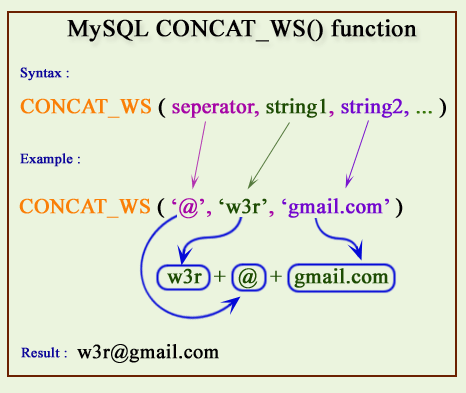MySQL CONCAT_WS() function
CONCAT_WS() function
MySQL CONCAT_WS() function is used to join two or more strings with a separator. The separator specified in the first argument is added between two strings. The separator itself can be a string. If the separator is NULL the result is NULL.
Syntax:
CONCAT_WS (separator, string1, string2,…)
Arguments
| Name | Description |
|---|---|
| separator | Specifies a separator added between the strings while joining. |
| string1 | First string to be joined. |
| string2 | Second string to be joined. Up to N number of strings can be specified in this way. |
Syntax Diagram:

MySQL Version: 5.6
Video Presentation:
Pictorial Presentation

Example of MySQL CONCAT_WS() function
The following MySQL statement adds the first argument and second argument with a separator ", ".
Code:
SELECT CONCAT_WS(',','1st string','2nd string');
Sample Output:
mysql> SELECT CONCAT_WS(',','1st string','2nd string');
+------------------------------------------+
| CONCAT_WS(',','1st string','2nd string') |
+------------------------------------------+
| 1st string,2nd string |
+------------------------------------------+
1 row in set (0.00 sec)
Example of MySQL CONCAT-WS() function with where clause
The following MySQL statement adds arguments (i.e. aut_id, aut_name, country and home_city) with a separator ",", if country of the author is not USA.
Code:
SELECT CONCAT_WS(',',aut_id,aut_name,country,home_city)
FROM author
WHERE country<>'USA';
Sample table: author
Sample Output:
mysql> SELECT CONCAT_WS(',',aut_id,aut_name,country,home_city)
-> FROM author
-> WHERE country<>'USA';
+--------------------------------------------------+
| CONCAT_WS(',',aut_id,aut_name,country,home_city) |
+--------------------------------------------------+
| AUT001,William Norton,UK,Cambridge |
| AUT002,William Maugham,Canada,Toronto |
| AUT003,William Anthony,UK,Leeds |
| AUT004,S.B.Swaminathan,India,Bangalore |
| AUT005,Thomas Morgan,Germany,Arnsberg |
| AUT007,Piers Gibson,UK,London |
| AUT009,Marquis de Ellis,Brazil,Rio De Janerio |
| AUT011,John Betjeman Hunter,Australia,Sydney |
| AUT012,Evan Hayek,Canada,Vancouver |
| AUT013,E. Howard,Australia,Adelaide |
| AUT014,C. J. Wilde,UK,London |
+--------------------------------------------------+
11 rows in set (0.00 sec)
PHP script:
<!doctype html>
<html lang="en">
<head>
<meta charset="utf-8">
<meta name="viewport" content="width=device-width, initial-scale=1">
<title>example-concat_ws-function - php mysql examples | w3resource</title>
<meta name="description" content="example-concat_ws-function - php mysql examples | w3resource">
<link rel="stylesheet" href="https://maxcdn.bootstrapcdn.com/bootstrap/3.3.5/css/bootstrap.min.css">
</head>
<body>
<div class="container">
<div class="row">
<div class="col-md-12">
<h2>list of authors id, name, country, home city:</h2>
<table class='table table-bordered'>
<tr>
<th>Author's id, name, country, home city</th>
</tr>
<?php
$hostname="your_hostname";
$username="your_username";
$password="your_password";
$db = "your_dbname";
$dbh = new PDO("mysql:host=$hostname;dbname=$db", $username, $password);
foreach($dbh->query('SELECT CONCAT_WS(",",aut_id,aut_name,country,home_city) as output
FROM author
WHERE country<>"USA"') as $row) {
echo "<tr>";
echo "<td>" . $row['output'] . "</td>";
echo "</tr>";
}
?>
</tbody></table>
</div>
</div>
</div>
</body>
</html>
JSP script:
<%@page contentType="text/html" pageEncoding="UTF-8"%>
<%@ page import="java.sql.*" %>
<%@ page import="java.io.*" %>
<!DOCTYPE html>
<html>
<head>
<meta http-equiv="Content-Type" content="text/html; charset=UTF-8">
<title>example-concat_ws-function</title>
</head>
<body>
<%
try {
Class.forName("com.mysql.jdbc.Driver").newInstance();
String Host = "jdbc:mysql://localhost:3306/w3resour_bookinfo";
Connection connection = null;
Statement statement = null;
ResultSet rs = null;
connection = DriverManager.getConnection(Host, "root", "datasoft123");
statement = connection.createStatement();
String Data ="SELECT CONCAT_WS(',',aut_id,aut_name,country,home_city) as output FROM author WHERE country<>'USA'";
rs = statement.executeQuery(Data);
%>
<TABLE border="1">
<tr width="10" bgcolor="#9979">
<td>Author's id, name, country, home city</td>
</tr>
<%
while (rs.next()) {
%>
<TR>
<TD><%=rs.getString("output")%></TD>
</TR>
<% } %>
</table>
<%
rs.close();
statement.close();
connection.close();
} catch (Exception ex) {
out.println("Cant connect to database.");
}
%>
</body>
</html>
Difference between MySQL GROUP_CONCAT() and CONCAT_WS()
GROUP_CONCAT() function returns a string with concatenated non-NULL value from a group.
CONCAT_WS() function is used to add two or more strings with separator
See the following example:
mysql> SELECT userid, fname, lname FROM user_details; +----------+--------+---------+ | userid | fname | lname | +----------+--------+---------+ | scott123 | Scott | Rayy | | ferp6734 | Palash | Ghosh | | diana094 | Diana | Lorentz | | abcd123 | John | ray | +----------+--------+---------+ 4 rows in set (0.00 sec)
mysql> SELECT GROUP_CONCAT(CONCAT_WS(' ', fname,lname)) FROM user_details ORDER BY userid ASC;
+------------------------------------------------+
| GROUP_CONCAT(CONCAT_WS(' ', fname,lname)) |
+------------------------------------------------+
| Scott Rayy,Palash Ghosh,Diana Lorentz,John ray |
+------------------------------------------------+
1 row in set (0.03 sec)
Here CONCAT_WS() insert a space as a separator between fname and lname while GROUP_CONCAT() returns the result in a single string.
Online Practice Editor:
All String Functions
Previous: CHARACTER_LENGTH
Next: CONCAT
- New Content published on w3resource:
- HTML-CSS Practical: Exercises, Practice, Solution
- Java Regular Expression: Exercises, Practice, Solution
- Scala Programming Exercises, Practice, Solution
- Python Itertools exercises
- Python Numpy exercises
- Python GeoPy Package exercises
- Python Pandas exercises
- Python nltk exercises
- Python BeautifulSoup exercises
- Form Template
- Composer - PHP Package Manager
- PHPUnit - PHP Testing
- Laravel - PHP Framework
- Angular - JavaScript Framework
- Vue - JavaScript Framework
- Jest - JavaScript Testing Framework

